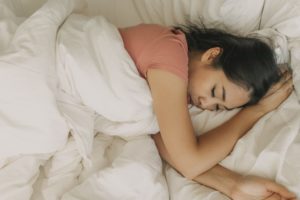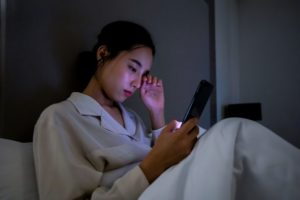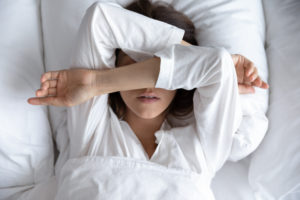When you buy through our links, we may earn a commission. Products or services may be offered by an affiliated entity. Learn more.
Is 6 Hours of Sleep Enough?
- Experts recommend adults get at least 7 hours of sleep per night for better health.
- Consistently getting less than 6 hours of sleep can have consequences for a person’s health and quality of life.
- Personal obligations, mental stressors, and physical health conditions commonly impact our ability to get the recommended hours of sleep.
- Healthy sleep habits may help improve your sleep quantity and sleep quality.
Those with busy schedules or fast-paced lifestyles may wonder if they can get by on less sleep at night. While some people regularly function on short periods of sleep, research mostly agrees that six hours of sleep is not enough for most adults. Experts recommend that most adults need at least seven hours of sleep every night.
We examine sleep needs for different age groups, discuss the importance of obtaining high-quality sleep, and provide tips on how to sleep better if you are struggling to meet sleep recommendations.
Looking to improve your sleep? Try upgrading your mattress.
Recommended Hours of Sleep by Age
Research shows that most adults need at least seven hours of sleep per 24-hour period. Exact sleep needs may vary from person to person, although the majority of people are believed to require amounts of sleep that fall within the recommended ranges. For example, teens need at least 8 to 10 hours, while children need more sleep of varying amounts that depend on their age.
| Age Group | Age Range | Recommended Hours of Sleep |
|---|---|---|
| Infant | 4-12 months old | 12-16 hours (including naps) |
| Toddler | 1-2 years old | 11-14 hours (including naps) |
| Preschool | 3-5 years old | 10-13 hours (including naps) |
| School-age | 6-12 years old | 9-12 hours |
| Teen | 13-18 years old | 8-10 hours |
| Adult | 18 years old and older | 7 or more hours |
Approximately one-third of adults regularly sleep for six hours or less each night, and surveys suggest that short sleep may be growing more common. A small percentage of people have sleep needs that fall outside of the recommended number of hours for their age group. Although it is rare, some people seem to need fewer than six hours of sleep per night. Similarly, others may need more than nine hours.
Researchers believe that genetics play a role in a person’s ability to handle short sleep. One way to gauge sleep needs is by observing when the body wakes up naturally, without an alarm clock. Also, if a person does not feel tired during the day, they may be obtaining enough sleep for their body.
Sleep Basics: Quality vs. Quantity
Sleep quantity refers to how many hours a person spends asleep, while sleep quality refers to how deeply they are sleeping. Both sleep quality and sleep quantity are equally important.
A solid night’s sleep consists of several sleep stages, through which the sleeper cycles multiple times. Each stage plays a role in repairing cells and preparing the body and mind for the next day. In order to feel well rested, a sleeper must spend adequate time in each sleep stage and sleep soundly without waking up too many times. Sleep disorders that interfere with sound sleep can cause performance deficits, mood changes, and daytime sleepiness similar to those experienced after short sleep.
It can be fairly difficult for a sleeper to accurately gauge their total sleep time. Some people significantly overestimate or underestimate sleep time. Likewise, people may not always be able to tell whether their sleep was high-quality or not.
A simple way to evaluate sleep quality is by monitoring how one feels during the day. People who sleep enough generally feel refreshed and alert. By contrast, people who do not sleep enough may feel drowsy during the day, especially during periods when they are less active.
Is It Normal to Have Daytime Sleepiness?
It is natural to feel sleepy at certain times of the day, such as the so-called afternoon slump . Conversely, someone who is short on sleep may still feel relatively alert during certain times of day, depending on their own personal body clock. However, being excessively tired, waking up feeling unrefreshed after a night’s sleep, or experiencing trouble navigating a day of work or school are all signs that a person might be experiencing sleep deprivation.
Sleeping much more on days off is one sign that a person may not be sleeping enough during the work week. Also, people who are sleep deprived often feel especially drowsy during monotonous activities, such as watching TV, attending a class or meeting, riding in a car, or sitting in traffic.
A very sleep-deprived person may experience microsleep, in which they fall asleep for just a few seconds at a time. It is possible to have a microsleep episode without realizing it, which can be very dangerous when driving or performing other activities that require attention. Experts warn that driving while sleepy is equally as dangerous as driving drunk.
People may find it difficult to recognize when they are chronically short on sleep. Those who sleep six hours or less on a regular basis may feel or appear like they have adapted to less sleep. However, they often feel more irritable, anxious, or depressed than usual. Someone who is short on sleep may also lack in certain areas, such as attention, judgment skills, and reaction time. For those in professions that require concentration, such as medical staff, mistakes from not sleeping enough can pose a serious risk.
The Impact of Getting Only 6 Hours of Sleep
Although many people believe they can learn to live on fewer hours of sleep, research does not support this idea. Experts agree that sleeping less than the recommended amount can have consequences for a person’s health and well-being.
Quality sleep is critical for mental health and clarity, physical health, immune system function, appetite regulation, and cell and tissue repair. People may have symptoms of sleep loss without realizing these are due to short sleep.
Mental Consequences of Short Sleep
Some immediate effects of sleep loss include daytime drowsiness, lack of energy, and reduced motivation. Mental effects of sleep loss include trouble concentrating, as well as problems with memory, learning, creativity, and problem-solving. Short sleep can also cause impaired decision-making, increased risk-taking, and a higher chance of accidents and errors. Also, people who do not sleep enough may be less productive at work.
Poor Mood From Sleep Deprivation
In the short term, sleep deprivation can cause difficulty managing emotions and a tendency toward irritability and restlessness. Prolonged sleep deprivation may increase the risk of developing depression and other mental health issues.
Reduced Quality of Life Due to Not Sleeping Enough
In addition to being easily fatigued, people who fall short on sleep may also feel generally unwell. Also, short sleep can dampen a person’s sex drive and overall quality of life.
Impaired Physical Performance From Lack of Sleep
Athletes might notice they have poor coordination and slower reaction times when they are running short on sleep. When deprived of sleep, athletes have also been found to run more slowly , exhibit less strength, and perform worse during certain actions like serving a tennis ball or kicking a soccer ball. Athletes who are short on sleep may also feel less energetic and enthusiastic during physical activity and become confused more easily.
Long-Term Health Effects of Sleep Deprivation
Chronic sleep deprivation has been linked to kidney disease and health issues such as obesity, type 2 diabetes, and metabolic syndrome. Consistently cutting sleep short can raise a person’s risk for heart health issues including high blood pressure, heart disease, and stroke.
Effects in Children
Sleep deprivation may appear differently in children than in adults. A child who fails to get enough sleep may act out and be hyperactive, or have trouble paying attention in school. Mood swings, angry outbursts, impulsivity, and sadness can also signal sleep loss in children. As with adults, not getting enough sleep can affect a child’s social interactions.
Why We Are Not Getting Enough Sleep
Many factors can make it difficult to obtain sufficient sleep, ranging from daily responsibilities to mental stressors to physical discomfort.
- Work schedules: When work, school, commuting, or caregiving responsibilities conflict with a person’s natural sleep-wake cycle, sleeping at times that are not concordant with normal sleep-wake times may lead to poor or insufficient sleep.
- Social obligations: Familial and social obligations can take up time that might otherwise have been used for sleep, especially when these take place in the evening.
- Substances: Alcohol, drugs, and wake-promoting medications can interfere with the body’s natural rhythms and make it more difficult to drift off to sleep.
- Sleep procrastination: It can be tempting to procrastinate on sleeping because it feels like a low priority in comparison to other activities. This may result in simply not having enough time to sleep the recommended amount.
- Physical health conditions: Medical conditions and the medication used to treat them can sometimes affect the sleep-wake cycle. Discomfort from chronic pain and breathing issues can make sleep difficult. Menstrual cycle hormones and aging can also contribute to sleep problems.
- Mental health: Anxiety and depression are known for their ability to interfere with sound sleep. Stress around the idea of not being able to fall asleep can exacerbate sleep issues.
- Sleep disorders: Sleep disorders such as insomnia, sleep apnea, or restless legs syndrome can cause fragmented sleep.
How to Get Enough Sleep
To sleep better, try following sleep hygiene recommendations, including these healthy daily habits.
- Have a fixed routine: Maintain a regular sleep schedule, including on weekends.
- Optimize your sleep space: Keep the bedroom environment cool, dark, and quiet, and invest in a comfortable sleep setup, including pillows and mattress.
- Prioritize relaxation: Have a bedtime routine with a wind-down period, including quiet activities like reading or taking a hot bath.
- Cut down on screen time: Put down electronic devices at least half an hour before bedtime and avoid clock-watching.
- Limit naps: Naps should last no longer than 30 minutes and should be taken earlier in the day.
- Get active: Exercise regularly, spend time outside, and seek out sunlight in the morning.
- Curb substance consumption: Avoid alcohol, cigarettes, caffeine, and rich meals close to bedtime.
Napping or sleeping in on the weekend are popular ways to cut down on sleep debt. You can also mitigate the effects of sleep loss by sleeping more the nights leading up to a night when you anticipate being unable to sleep enough.
However, these activities may interfere with natural sleep-wake rhythms, and they may not offer sufficient time to catch up on missed sleep. The best strategy is to keep a consistent sleep and wake times that allow for at least seven hours of sleep every night.
The optimal time to fall asleep after lights-out is 15 to 20 minutes. If you still have trouble sleeping despite implementing these tips, ask your doctor for a referral to a sleep specialist. The sleep specialist can provide additional recommendations or help diagnose and treat an underlying sleep disorder.

Still have questions? Ask our community!
Join our Sleep Care Community — a trusted hub of sleep health professionals, product specialists, and people just like you. Whether you need expert sleep advice for your insomnia or you’re searching for the perfect mattress, we’ve got you covered. Get personalized guidance from the experts who know sleep best.
References
5 Sources
-
Paruthi, S., Brooks, L. J., D’Ambrosio, C., Hall, W. A., Kotagal, S., Lloyd, R. M., Malow, B. A., Maski, K., Nichols, C., Quan, S. F., Rosen, C. L., Troester, M. M., & Wise, M. S. (2016). Consensus statement of the American Academy of Sleep Medicine on the recommended amount of sleep for healthy children: Methodology and discussion. Journal of Clinical Sleep Medicine, 12(11), 1549–1561.
https://pubmed.ncbi.nlm.nih.gov/27707447/ -
Cirelli, C. (2022, October 10). Insufficient sleep: Definition, epidemiology, and adverse outcomes. In R. Benca (Ed.). UpToDate., Retrieved February 8, 2023, from
https://www.uptodate.com/contents/insufficient-sleep-definition-epidemiology-and-adverse-outcomes -
Girschik, J., Fritschi, L., Heyworth, J., & Waters, F. (2012). Validation of self-reported sleep against actigraphy. Journal of Epidemiology, 22(5), 462–468.
https://pubmed.ncbi.nlm.nih.gov/22850546/ -
National Institute of General Medical Sciences. (2022, May 4). Circadian rhythms., Retrieved February 8, 2023, from
https://www.nigms.nih.gov/education/fact-sheets/Pages/circadian-rhythms.aspx -
Vitale, K. C., Owens, R., Hopkins, S. R., & Malhotra, A. (2019). Sleep hygiene for optimizing recovery in athletes: Review and recommendations. International Journal of Sports Medicine, 40(8), 535–543.
https://pubmed.ncbi.nlm.nih.gov/31288293/











